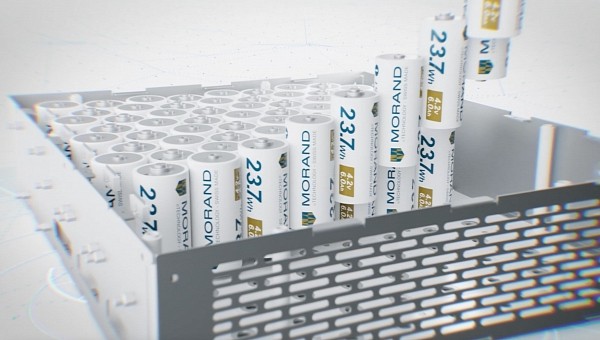What scares most customers about electric cars is that they are not mature enough. The cell technology they present demands a lot of time to charge their battery packs or aggressive fast charging sessions that reduce their lifespans. Solid-state cells may tackle that, but two Swiss companies are proposing a different approach: hybrid ultracapacitors.
Cells are good at storing energy but lousy at charging and discharging. Ultracapacitors are unbeatable in releasing and recovering charge but do not store much energy. They also have a high self-discharge rate, meaning they lose power if not used. That’s due to how they operate: batteries store energy through chemical processes, while ultracapacitors do so with electrostatic fields. Apparently, Sech SA created something that puts the best characteristics of these devices.
Its hybrid ultracapacitor (HUC) can be operated in a voltage range of 2.8V up to 4.2V, achieve more than 50,000 cycles at 10C, and resist charging rates of up to 80C. What it means is that it can charge really fast. Morand decided to integrate these HUCs into what it calls eTechnology.
This “energy storage technology” is allegedly capable of getting a city car recharged to 80% of capacity in 72 seconds, but Morand failed to mention the starting point. It could be 10% of capacity, a wholly discharged HUC pack… We’ll have to ask them about that. The company did not mention a city car randomly.
Sech SA states its HUC has a pretty high energy density for ultracapacitors. Although that is correct, the numbers are disappointing compared to lithium-ion cells: 77 Wh/kg. That’s about half what lithium iron phosphate (LFP) cells can deliver. In other words, a car with an LFP battery pack with 200 miles (322 kilometers) of range would offer a range of only 100 mi (161 km) with the Morand eTechnology. It would have to be twice as large to reach the same range.
If recharging took only 72 seconds, people would probably not mind having the 100-mile HUC pack, but here’s another catch: the Morand eTechnology needs a fast charger with a speed of 360 kW (900A) to recover energy that fast. Currently, such fast chargers are pretty rare. They also demand a humongous amount of energy to work.
The last handicap with the system is that it is more expensive than a lithium-ion battery pack. Morand said this is related to low production volumes, but higher production will lead to price parity with battery packs. Considering how expensive these components currently are, that is not really reassuring.
The good news is that it is long-lasting. If we use the 100-mi pack as an example, it could endure 50,000 cycles at 10C or much more with slower charging. Counting only fast charging sessions, that would make the HUC pack last 5 million miles (8,046,720 km). If that were included in warranty terms, people would never have to worry about replacing such a HUC pack.
Unfortunately, Morand did not disclose how much time the eTechnology pack takes to charge in more modest conditions. If it is also faster on a 220V outlet or even a 22 kW charger, several people would probably be willing to live with it. That’s something else we will try to learn from them.
Its hybrid ultracapacitor (HUC) can be operated in a voltage range of 2.8V up to 4.2V, achieve more than 50,000 cycles at 10C, and resist charging rates of up to 80C. What it means is that it can charge really fast. Morand decided to integrate these HUCs into what it calls eTechnology.
This “energy storage technology” is allegedly capable of getting a city car recharged to 80% of capacity in 72 seconds, but Morand failed to mention the starting point. It could be 10% of capacity, a wholly discharged HUC pack… We’ll have to ask them about that. The company did not mention a city car randomly.
Sech SA states its HUC has a pretty high energy density for ultracapacitors. Although that is correct, the numbers are disappointing compared to lithium-ion cells: 77 Wh/kg. That’s about half what lithium iron phosphate (LFP) cells can deliver. In other words, a car with an LFP battery pack with 200 miles (322 kilometers) of range would offer a range of only 100 mi (161 km) with the Morand eTechnology. It would have to be twice as large to reach the same range.
If recharging took only 72 seconds, people would probably not mind having the 100-mile HUC pack, but here’s another catch: the Morand eTechnology needs a fast charger with a speed of 360 kW (900A) to recover energy that fast. Currently, such fast chargers are pretty rare. They also demand a humongous amount of energy to work.
The last handicap with the system is that it is more expensive than a lithium-ion battery pack. Morand said this is related to low production volumes, but higher production will lead to price parity with battery packs. Considering how expensive these components currently are, that is not really reassuring.
The good news is that it is long-lasting. If we use the 100-mi pack as an example, it could endure 50,000 cycles at 10C or much more with slower charging. Counting only fast charging sessions, that would make the HUC pack last 5 million miles (8,046,720 km). If that were included in warranty terms, people would never have to worry about replacing such a HUC pack.
Unfortunately, Morand did not disclose how much time the eTechnology pack takes to charge in more modest conditions. If it is also faster on a 220V outlet or even a 22 kW charger, several people would probably be willing to live with it. That’s something else we will try to learn from them.






